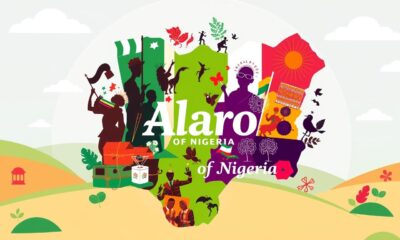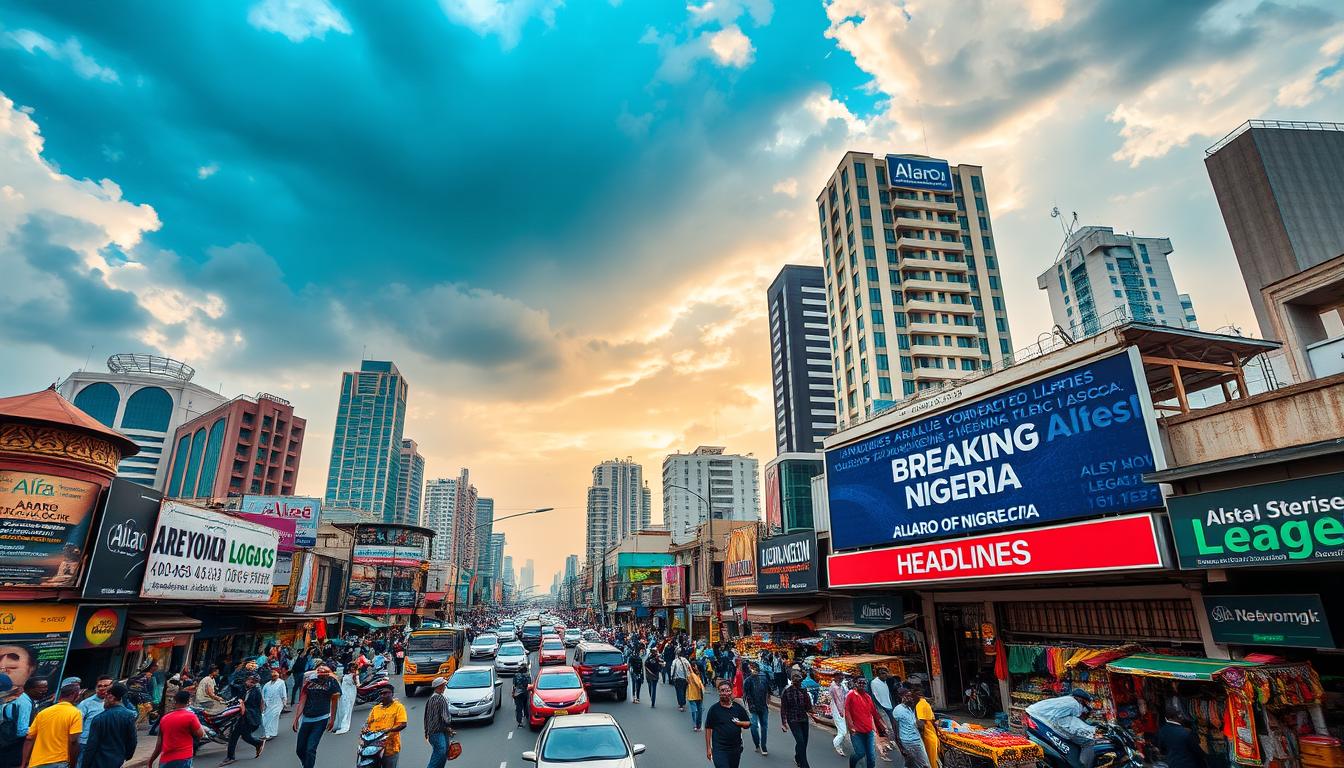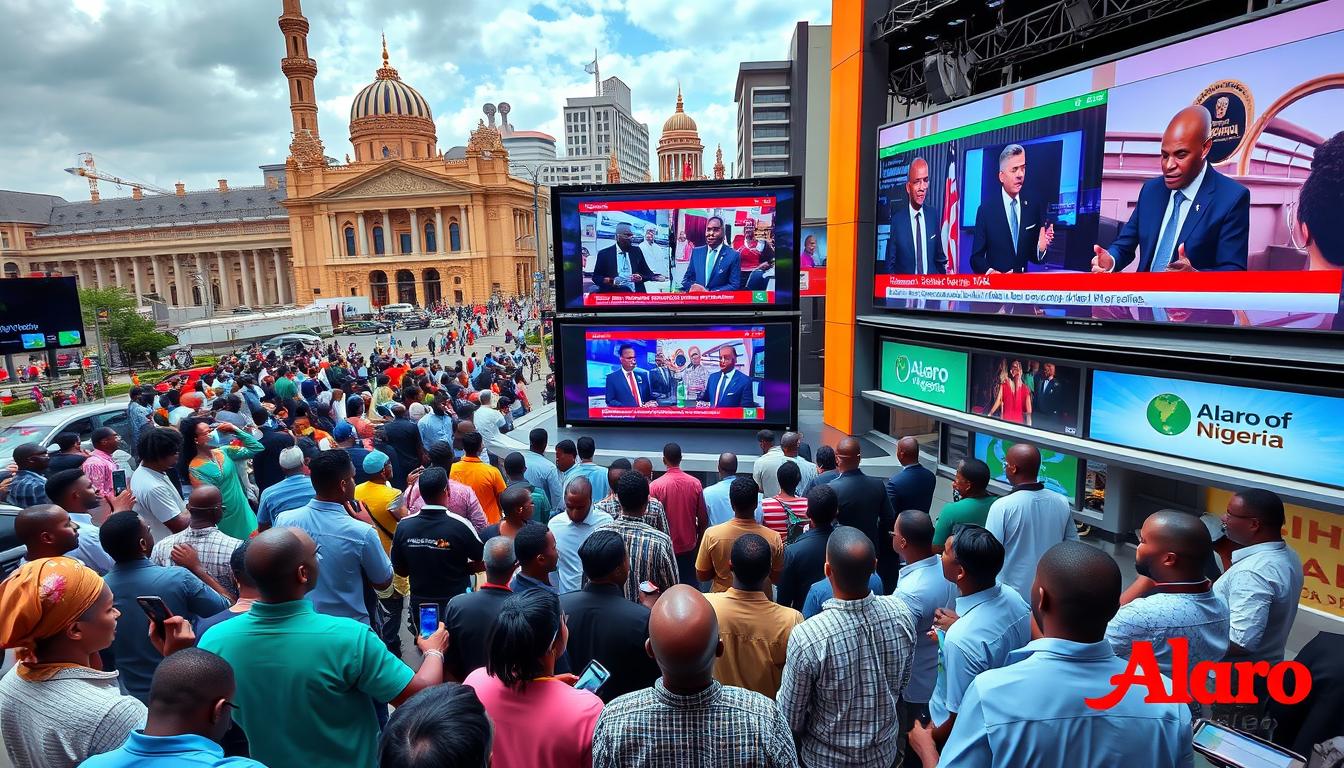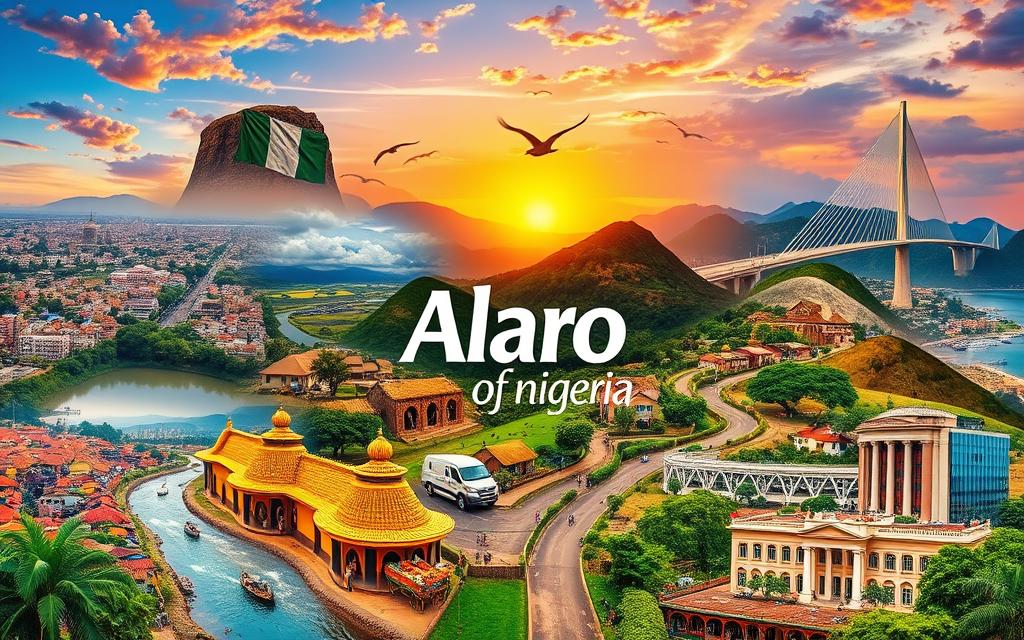News
Inside Nigeria: Top Trends and Daily Stories
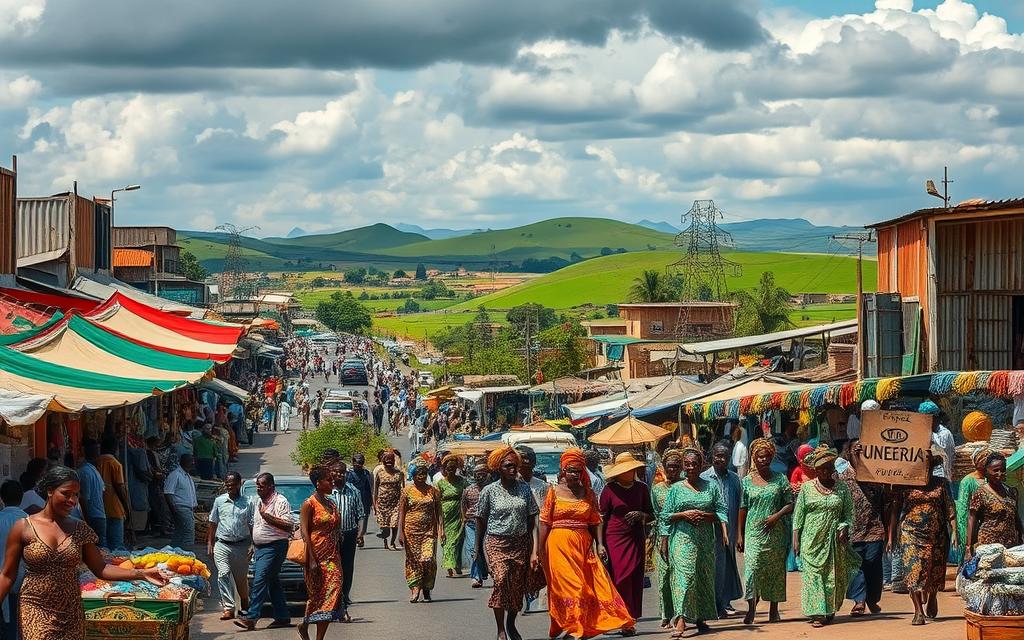
Exploring Nigerian culture and economy reveals a key truth: investing in youth is crucial. This investment can ignite the next generation’s potential and ensure sustainable growth. Did you know that if things don’t change, 33 million Nigerians might face severe food shortages by mid-20251? Our journey through Nigeria isn’t just numbers. It’s about celebrating the spirit, creativity, and life stories that define Nigeria every day.
Nigerians are making waves in many areas, like business and sports. Their talent and hard work shine through every challenge. Yet, difficulties remain. Chinua Achebe pointed out, ‘The trouble with Nigeria is a failure of leadership.’ We must confront this problem to create real change. I grew up in a small Nigerian town, witnessing changing markets and streets. Yet, people’s hardships stayed the same. Here’s the reason.
Let’s dive into the trends and stories that show Nigeria’s true essence today.
Key Takeaways
- Investment in youth is essential for Nigeria’s future prosperity.
- Understanding food insecurity trends is vital for addressing social issues.
- Leadership challenges must be confronted for meaningful change.
- Nigerians are innovating across sectors, driving economic growth.
- Our personal stories and experiences shape the national narrative.
Nigerian Entrepreneurs Driving Economic Growth
The spirit of entrepreneurship in Nigeria is soaring, making it the “Giant of Africa.” Young Nigerians are eagerly starting their businesses, inspired by several factors. Support from the government, easy-to-get funding, and tech advances help a lot. Additionally, easier market access and more young people wanting to make their own money play a big role in Nigeria’s economic rise2. This energy is visible in the success of both well-established companies and new startups.
Emerging Startups and Their Impact
Startups in Nigeria are key to shaping the business scene. With a population over 200 million, there’s a lot of room for growth3. Using ICT tools has made sharing information easy and fast3. Entrepreneurs often use social media and online forums to make valuable connections. Also, e-commerce lets them show their products to the world, reaching more customers than ever3. These steps help the economy grow by creating jobs and bringing healthy competition.
Success Stories from the Nigerian Tech Industry
In the tech world, Nigeria has many inspiring success stories. Notables like Aliko Dangote and Folorunsho Alakija have achieved great things. Dangote leads a group worth over $11 billion. Alakija has made major marks in oil, fashion, and real estate, also advocating for women2. They show how being innovative, committed, and flexible is key to success. Today’s tech also means easy and safe online payments, helping dreams come true3.
Nigerian Sports: Rising Stars and Global Recognition
Stars in Nigerian sports shine brightly on the global stage, notably in football and athletics. The Super Eagles show great resilience in qualifiers, symbolizing our football dreams. Football’s popularity is climbing, as seen in youth participation numbers. An estimated X% of Nigerian youth see football as an escape from poverty. This makes the sport a beacon of hope4.
Key Highlights from Recent Football Events
In recent tournaments, teams like Enyimba FC and Kano Pillars have shown off their skills. They enjoy solid support from fans known for their loyalty5. Football events draw huge crowds. Fans often turn away stadiums into home fields for our team. Their dedication boosts the economy by increasing sales of football goods and services. This shows a strong link between football and economic growth4.
Success of Nigerian Athletes in International Competitions
Nigerian athletes have excelled internationally, earning accolades in big events like the Olympics. Chioma Ajunwa’s long jump gold in 1996 was historic. She was the first Nigerian to win Olympic gold6. Blessing Okagbare has thrilled fans with her outstanding sprint and long jump records. Her successes, along with those of legends like Hakeem Olajuwon and Kelechi Iheanacho, boost our national pride6.
Nigerian Diaspora: Contributions and Challenges
The Nigerian diaspora is an important group that deeply impacts countries all around the globe, including Nigeria. This community, made up of about 125 million people, moves to new places every year. They help through sending money back home, sharing their knowledge, and spreading their culture7. Let’s explore how Nigerians living abroad make a difference and the hurdles they face in staying connected to Nigeria.
Achievements of Nigerians Abroad
Nigerians all over the world have created groups that cover many continents like Europe, the Americas, and Africa8. They’ve improved their careers and brought valuable knowledge back to Nigeria. Remittances have grown a lot, becoming five times higher in the last two decades. This money is key for many Nigerian families9. In 2017, remittances to Nigeria were the highest in Sub-Saharan Africa, reaching 22 billion US dollars8.
In 2018, an impressive $25.1 billion was sent back by Nigerians living abroad9. This shows the huge economic impact they have. The Central Bank of Nigeria makes sure these money transfers are done right8. Even with their success, Nigerians abroad struggle with fitting in and keeping their culture. It’s vital they maintain a strong bond with their heritage while adapting to new places.
Local Governance in Nigeria: Current Trends
Understanding how local governance works in Nigeria is crucial. It affects community growth and how people connect with democracy. Good local governance is key in making sure the government and its citizens are on the same page. It helps make sure policies meet local needs and makes things clearer for everyone.
Importance of Community Engagement
Community participation is vital for effective local governance in Nigeria. It allows people to have a say in decisions that affect them. Local governments are there to give people a way to share what’s important to them. This kind of involvement ensures services are built around what the community really needs. It boosts democracy and gives people more control locally10.
Recent Local Elections and Their Outcomes
The latest local elections highlighted the power of community involvement in Nigeria. In states like Kaduna and Kano, better governance resulted from people taking part11. These elections showed that active communities can influence who leads them, ensuring leaders match the community’s diverse needs and hopes. Local governments play a crucial role in making sure everyone’s voice is heard. They help tackle local issues by encouraging widespread community involvement10.
Nigeria Tourism: Attractions and Opportunities
Nigeria’s tourism is on the rise, featuring beautiful destinations like Zuma Rock and Olumo Rock. These places encourage cultural connections and show off Nigeria’s natural beauty. Ecotourism is now playing a big part in bringing in tourists and helping the environment.
Top Tourist Destinations in Nigeria
More and more Nigerians are exploring their country, thanks to efforts like the “Tour Nigeria” campaign12. Places like national parks and cultural sites are drawing crowds from within Nigeria and abroad. This interest is boosting the economy, adding $17.3 billion to Nigeria’s GDP in 202213.
The Role of Ecotourism in Nigeria’s Economy
Ecotourism is vital for Nigeria, blending environmental care with tourism income for communities12. High-end hotels showcasing Nigerian culture are making a mark. Still, the country faces challenges like safety and infrastructure, yet efforts are being made to improve these areas, making Nigeria’s gems shine brighter13.
Inflation in Nigeria: Causes and Effects
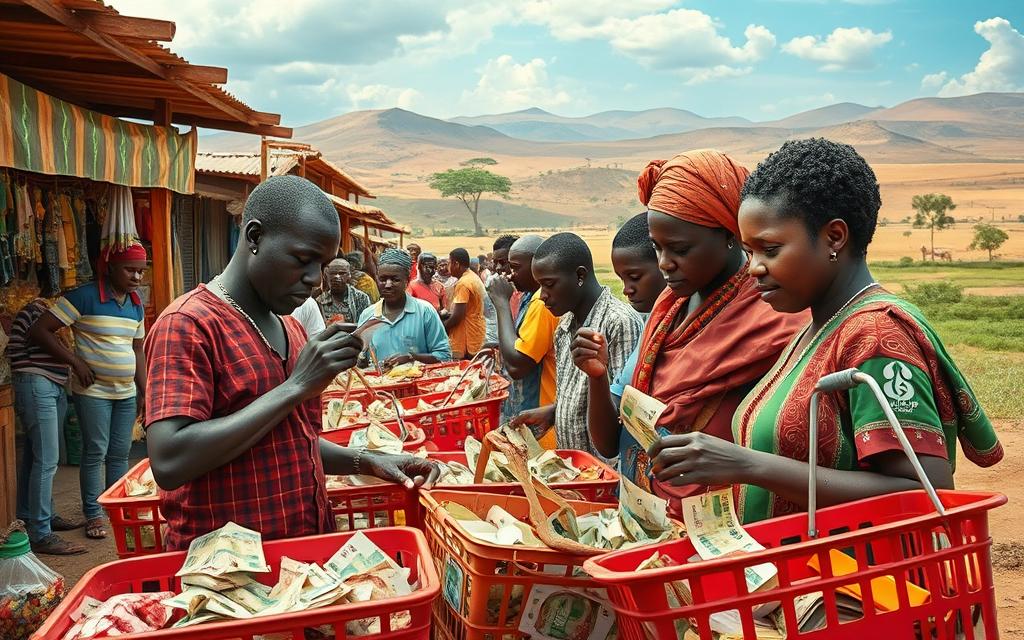
Inflation in Nigeria is a big issue, hitting everyone’s daily life hard. The inflation rate is now around 33.20% for 2024, up a lot from last year14. Things like food and petrol are getting much more expensive. For example, petrol prices have shot up three times in just nine months. At the same time, the price of rice has doubled15. Families struggle to buy what they need because of these price hikes.
Impact on Daily Life and Purchasing Power
People in Nigeria face tough times because of inflation. The value of their money, the naira, has dropped. This makes imported stuff much more costly. The price of building materials has gone up by 700% in five years16. This makes it hard for those wanting to build homes or any property. Also, with the minimum wage at 30,000 naira, about $19, it’s hard for families to keep up15.
Government Measures to Combat Inflation
The government is trying different things to fix the economy. They’ve set up a board to keep food prices in check and are giving out grains from their stocks15. They’re also helping about 15 million families with some money each month. But, with everything becoming more expensive, this help doesn’t go far. It’s only 25,000 naira15. They’re working on more plans to keep the value of their money stable, hoping it will help with the inflation problems16.
Nigerian Democracy: Current Issues and Developments
Exploring Nigerian democracy shows us that political affairs are growing more complex. The nation has enjoyed over 25 years of democracy but faces challenges. It’s mainly led by two parties—the Peoples Democratic Party (PDP) and the All Progressives Congress (APC). This creates a clear divide17. Over these years, Nigeria has seen five presidents. Currently, Bola Ahmed Tinubu is tackling many issues, including security and public dissatisfaction17.
The State of Political Affairs
The 2023 general elections saw the lowest turnout ever, with only 25 million voters18. Despite high youth registration, broader participation stayed low18. Many critique the electoral system as flawed, not living up to public expectations. This has raised concerns about the fairness of elections17. Reports of violence and irregularities during the elections have made people unsure about democracy’s future18.
Election Campaigns and Public Sentiment
People are closely watching the electoral system, demanding urgent reforms17. Recent campaigns have not only called for accountability but also for governance we can believe in17. The impact of colonialism and military rule on today’s governance is clear. This shows a big change is needed for electoral outcomes to be trusted18.
| Indicator | Value |
|---|---|
| Voter Turnout (2023) | 25 million voters (lowest in history) |
| Young Voter Percentage | 76% of newly registered voters |
| Student Voter Registration | 27.8% of total registered voters |
| Voter Turnout Compared to Eligible Voters | Less than a third of eligible voters |
| Election Result Margin | 3-2 million votes difference among top candidates |
Nigerian Celebrities: Cultural Influencers in Media
Nigerian celebrities are big cultural influencers, thanks to Nollywood’s worldwide fame. Stars like Genevieve Nnaji and Burna Boy help form how people see Nigerian culture. They influence perceptions both in Nigeria and across the globe.
Impact of Nollywood on Nigerian Culture
Nollywood has become a key player in the world’s movie scene. This has helped shape Nigeria’s identity and culture. Stars such as Tiwa Savage and Wizkid shine not just in music but in fashion too. They mix traditional and modern vibes, showing off Nigeria’s rich culture. On Instagram, they’re praised for their trendy fashion choices and bold statements.
For example, Nancy Isime is known for her bold fashion picks19. Her choices appeal to young people, making her a fashion leader in both media and style. Film and social media work together here. They boost the impact of these influencers on public discussions.
Nigerian celebrities like Ini Edo and Chioma Ikokwu lead in setting fashion trends. They show off glamorous clothes and start fashion talks among fans20. Through them, Nollywood helps highlight Nigeria’s distinct identity and culture.
Nigerian Food: Culinary Traditions and Innovations
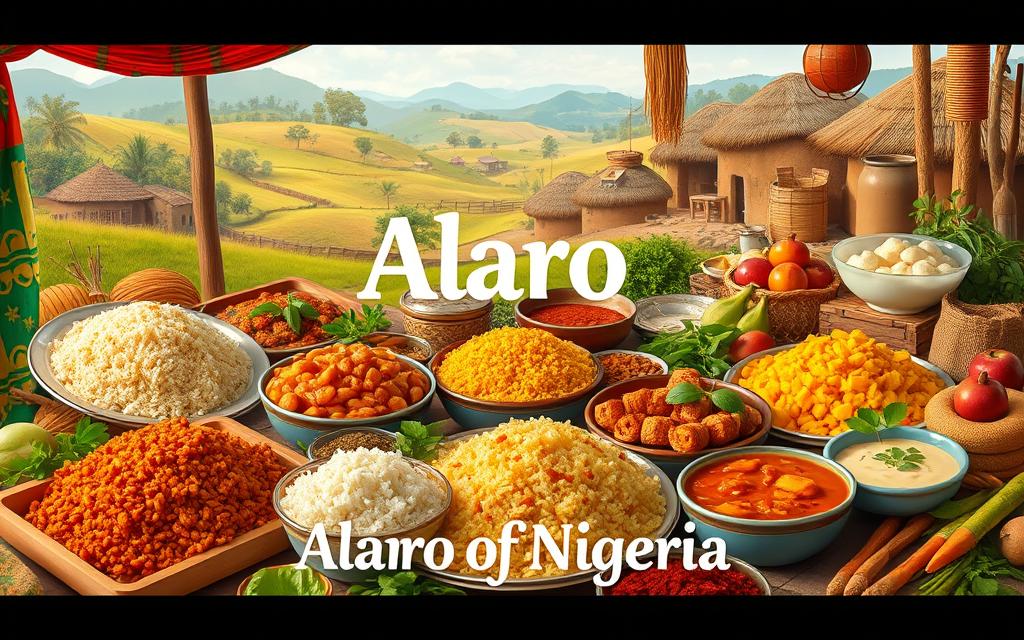
Nigerian cuisine showcases our rich culture through diverse culinary practices. Favorites like jollof rice and pounded yam highlight our historical and cultural heritage. Ingredients like seafood, beef, poultry, and goat provide rich protein, leading to flavorful nationwide staples21. Rice is especially important, often found in various forms during festive occasions.
Popular Dishes and Their Cultural Significance
Okoho soup, using the regional okoho plant, showcases the ingenuity of our cuisine. It represents our utilization of local ingredients. Dishes like Alkubus and Paten Acha introduce northern culinary specialties22. Breakfast might feature Sinasir, a rice pancake, while Ikpakpa emphasizes the nutritional value of red kidney beans. Our traditional meals reflect our community values, showing that food goes beyond simple nourishment.
Growing Interest in Nigerian Cuisine Internationally
The global interest in Nigerian food is skyrocketing. Chefs and home cooks are embracing our bold flavors and textures. Nigerian dishes, such as jollof rice and efo riro, are becoming stars at international food festivals. This recognition helps our culinary traditions cross borders2122. It enriches the global food scene, inviting the world to explore the depths of Nigerian cuisine.
Nigerian Social Issues: Addressing Challenges
In Nigeria, several social issues demand our attention for the betterment of our communities. We face poverty, educational gaps, and health issues, causing unrest. Insecurity is a major concern, with Nigeria ranking low on the Global Peace Index since 201223. This shows a growing fear of crime. Kidnapping rates are alarming, averaging 13 victims daily, totaling 2,371 in six months during 202124.
Current Pressing Social Issues in Nigeria
Today, the fight against these issues is stronger. Many organizations and individuals are making strides towards change. Though the government is increasing security efforts to combat banditry and kidnappings, challenges persist. A critical report revealed the severe impact of the exchange rate on economic stability, with the US dollar reaching N1,680 in the black market on October 4, 202425.
Moreover, banditry has displaced over 200,000 people, leaving farmlands barren and worsening the food crisis24. Understanding the causes of these social issues is crucial. By identifying and supporting social activism, we can start meaningful conversations. These discussions will lead to justice and equity in Nigeria.
Inside Nigeria: Top Trends and Daily Stories
In Nigeria, social media shapes what people think and talk about. Sites like Twitter and Instagram do more than entertain. They’re powerful tools that shape news and cultural discussions. People use these sites not just to share life stories, but also to spotlight important social issues. This helps bring attention to different causes.
The Role of Social Media in Shaping Perception
Recent times show social media’s big role in making sure Nigerian voices, especially the youth, are heard. In 2024, the military neutralized 8,034 terrorists, and many social justice causes picked up steam. We’re seeing a mix of classic media and grassroots activism on social media in Nigeria2627. What happens on these platforms can even push the government to act. This was seen when the Nigerian police were called out for brutality and had to take action27.
Social media is also a place where Nigerians tell their stories. They share personal journeys, cultural backgrounds, and community wins, building a sense of togetherness. The news of over 7,000 graduates from OAU highlights how achievements are celebrated on these platforms, making Nigerian successes known worldwide26. Also, people talk about economic changes, like the naira getting stronger against the dollar. This opens up discussions about the economy among users27.
Conclusion
Reflecting on Nigeria’s narrative, we see our rich culture and shared struggles. Nigeria has a poverty rate of 38.9%, with nearly 87 million people living in poverty. This makes it the world’s second-largest poor population, just after India28. While some regions are thriving, others are far behind, showing a big divide28.
Nigerian culture and innovation are becoming key. This is especially true in health tech and traditional medicine. The growth of telehealth during the pandemic shows a big change in tackling health issues. It points to a future full of possibilities29.
Our media scene is booming, with over 65 national and regional newspapers. This shows our country’s strong culture of communication. Millions are engaged daily, highlighting a wealth of stories yet to be shared30.
Understanding these aspects is important for unity and progress in Nigeria. By sharing our stories, we connect with the world in a more meaningful way.
FAQ
What are some key trends in the Nigerian entrepreneurial landscape?
How are Nigerian athletes contributing to global sports?
What role does the Nigerian diaspora play in national development?
Why is local governance important in Nigeria?
What are some popular tourist destinations in Nigeria?
How is inflation currently affecting Nigeria?
What challenges does Nigerian democracy currently face?
How significant is Nollywood to Nigerian culture?
What are some notable Nigerian dishes known internationally?
What pressing social issues are currently being addressed in Nigeria?
How is social media influencing perceptions in Nigeria?
News
Nigeria Police Shield Crypto Scammer Jesam Michael

Imagine losing millions to a promise of guaranteed returns, only to find the system stacked against you. This is the harsh reality for investors in Afriq Arbitrage System (AAS), led by Jesam Michael, who now faces allegations of defrauding investors of $87.6 million.
The case took a troubling turn when the Nigerian police, supported by the Special Investigation Unit (SIU), detained individuals accused of cyberbullying Michael. This raises questions about the fairness of the investigation and the protection of victims’ rights.
The Inspector General of Police (IGP) and the Nigeria Immigration Service were involved in the arrests, sparking concerns about the impartiality of law enforcement in this matter. As the investigation unfolds, one thing is clear: the need for transparency and justice for all parties involved.
Background of the Case and Police High Command Compromise
The case involving Jesam Michael and the Afriq Arbitrage System (AAS) has brought to light serious concerns about the integrity of Nigeria’s law enforcement. Reports from SaharaReporters indicate that high-ranking police officials may have been compromised, potentially shielding Michael from scrutiny.
Overview of the Police Hierarchy Involvement
The Nigerian police structure is hierarchical, with the Inspector General of Police (IGP) at the top. The Special Investigation Unit (SIU) operates under this hierarchy, tasked with handling complex cases. However, in this case, the SIU’s involvement has raised eyebrows due to allegations of bias.
The Nigeria Immigration Service has also been implicated, with their role in detaining individuals accused of cyberbullying Michael. This has led to questions about the fairness and impartiality of the investigation.
Timeline of Key Events
The timeline begins with Michael reporting a fraud claim to the IGP, alleging he was defrauded of $87 million by Abayomi Segun Oluwasesan. This led to a series of events, including the detention of individuals critical of Michael.
By February, the investigation was underway, but the police high command’s actions have been called into question. The SIU’s role has been particularly scrutinized, with concerns about whether the unit acted independently or was influenced by external factors.
The involvement of the Nigeria Immigration Service adds another layer to the case, suggesting a coordinated effort that may have delayed investor fund withdrawals. As the situation unfolds, transparency and accountability remain critical to ensuring justice for all parties involved.
Detailed Account of Jesam Michael’s Arrest
The arrest of Jesam Michael unfolded through a coordinated operation involving the Nigeria Immigration Service and the Special Investigation Unit (SIU) under the Inspector General of Police (IGP). This case has drawn significant attention due to its complexity and the allegations of fraud tied to the Afriq Arbitrage System (AAS).
Role of the Nigeria Immigration Service and SIU
The Nigeria Immigration Service played a key role in apprehending Jesam Michael, collaborating closely with the SIU. Their joint efforts were instrumental in executing the arrest, showcasing a structured approach to handling high-profile cases.
The SIU provided critical support during the operation, ensuring that the legal framework was followed meticulously. Their involvement underscored the seriousness of the allegations against Michael.
Investigation and Arrest Timeline
The investigation began when Jesam Michael reported being defrauded of $87 million to the IGP. This led to a thorough probe, revealing discrepancies in asset transfers and a lack of legitimate trading evidence.
By February, the SIU had gathered sufficient evidence to proceed with the arrest. The timeline highlights the meticulous planning and coordination between the SIU and the Nigeria Immigration Service.
The case revealed that Michael had transferred recovered funds into his personal name, raising concerns about the management of investor assets. These findings have added layers to the legal proceedings, emphasizing the need for transparency.
How Nigeria Police Protected Nigeria’s Cryptocurrenc Criminals, Jesam Michael
The case of Jesam Michael, CEO of the Afriq Arbitrage System (AAS), has exposed deep concerns about the Nigerian police’s role in shielding suspects. Reports from SaharaReporters reveal that high-ranking officials acted swiftly to secure Michael’s release after his arrest.
The police hierarchy employed specific tactics to protect Michael. They detained individuals accused of cyberbullying linked to him, a move that supported his narrative. This approach not only raised questions about the fairness of the investigation but also weakened public confidence in the police command.
Evidence suggests that the detained individuals were released prematurely, further undermining the investigation’s credibility. This shielding has significant implications for investor safety and the integrity of future probes.
These actions highlight systemic issues within the police force, where protecting certain individuals seems to take precedence over justice. The lack of transparency and accountability raises concerns about the fairness of Nigeria’s legal system.
Analysis of Financial Exploitation and Fraud Tactics
The case of Jesam Michael and the Afriq Arbitrage System (AAS) reveals a complex web of financial exploitation. Investors were lured with promises of high returns, only to find their funds locked for over 18 months. This mirrors tactics used by Michael’s previous venture in the US, which was shut down for operating a Ponzi scheme.
Documents from the State of California highlight how referral programs were used to recruit investors, resembling pyramid schemes. These programs incentivized existing investors to bring in new ones, creating a false sense of legitimacy. The lack of credible trading evidence and a clear repayment plan further raises red flags about the operation’s legitimacy.
| Country | Fraudulent Tactics | Outcome |
|---|---|---|
| Nigeria | High-return promises, referral programs | Funds withheld for over 18 months |
| USA | Ponzi scheme operations | Shutdown by California authorities |
The investigation uncovered that funds were transferred into Michael’s personal accounts, adding to the suspicion of fraud. This case underscores the need for stricter regulations and investor protections in both countries.
Impact on Investors and Associated Victims
The case of Jesam Michael has left countless investors in financial ruin. Many have been unable to recover their principal funds or receive promised returns for over 18 months. This prolonged withdrawal issue has caused severe financial strain and emotional distress.
The situation worsened when several individuals were arrested for cyberbullying linked to Michael. These arrests not only added to the social stigma but also raised concerns about the fairness of the investigation. Victims felt their voices were being silenced, further complicating their quest for justice.
The police’s actions, including detaining critics, have drawn criticism. This perceived bias has deepened the suffering of victims, who already feel betrayed by the system. The lack of transparency in the investigation has eroded trust in law enforcement and the financial systems they are supposed to protect.
| Country | Fraudulent Tactics | Outcome |
|---|---|---|
| Nigeria | High-return promises, referral programs | Funds withheld for over 18 months |
| USA | Ponzi scheme operations | Shutdown by California authorities |
This case underscores the broader implications for investor trust in crypto trading. The lack of accountability and transparency has left many questioning the integrity of financial systems. As the situation unfolds, it’s clear that systemic changes are needed to protect investors and ensure justice.
Conclusion
The case of Jesam Michael has unveiled significant flaws in Nigeria’s law enforcement system, particularly in how high-profile individuals are handled. Victims of financial fraud have faced prolonged delays in recovering their investments, leading to widespread distrust in the system.
The Special Investigation Unit (SIU) and the Nigeria Immigration Service played pivotal roles in Michael’s arrest. However, the transparency of these actions has been questioned, raising concerns about impartiality and the influence of external factors.
The impact on investors has been devastating, with many facing financial ruin and emotional distress. The detention of critics linked to Michael further complicated the situation, silencing voices and deepening suffering.
Systemic issues within the police force have undermined public confidence. The need for greater accountability and transparency is evident to restore trust in both law enforcement and financial systems.
As this case continues to unfold, it is imperative to demand reforms and greater scrutiny of such investigations. Only through systemic change can justice and investor protection be ensured.
News
Marc Fogel Released from Russian Detainment
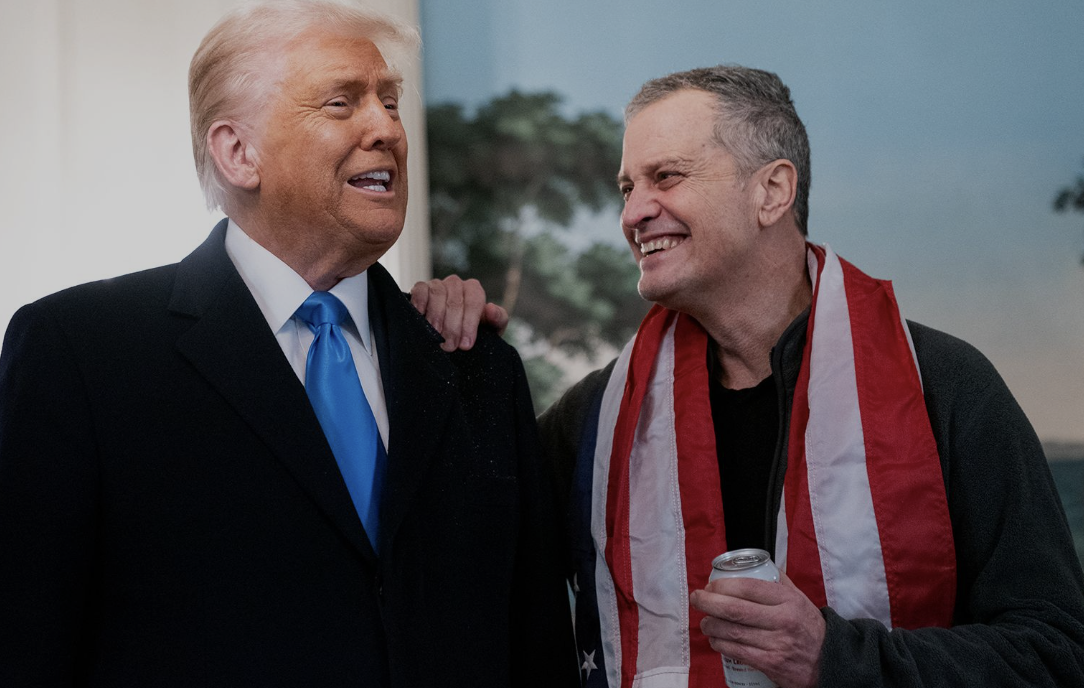
Thinking about Marc Fogel’s journey, we’re filled with relief. After over three years of waiting and fighting, he’s free. This isn’t just about one man’s fight for freedom. It’s a story about strong bonds and never losing hope that brings us all together. Fogel’s comeback is key for his loved ones who fought for his release during tough times.
His return to the U.S. shows how thankful he is for the support. It’s a victory for everyone who backed him. Reflecting on this, let’s remember how important it is to stick together through hard times. These are moments we shouldn’t forget as we fight for justice and peace. We hope Fogel’s release brings a positive change in our dealings with other countries and in protecting our freedoms.
Background on Marc Fogel’s Detention
Marc Fogel’s time in a Russian jail highlights wrongful imprisonment talks. In August 2021, he was caught with 17 grams of cannabis at a Moscow airport. The cannabis was for medical use, prescribed by a U.S. doctor. Still, he faced serious charges. By June 2022, Fogel was sentenced to 14 years in a penal colony for “large-scale drug smuggling.” His case drew global attention, especially regarding how foreign detainees are treated.
While detained, Fogel spent around 1,278 days under tough conditions. He was hospitalized for over 100 days and received more than 400 injections, showing his health problems. In December 2024, the U.S. labeled him as “wrongfully detained.” This highlighted growing worries about his wellbeing. Before his release, the Senate pushed for action with a bipartisan resolution, highlighting efforts to free him.
Marc Fogel’s ordeal is central to discussions on U.S.-Russia relations and foreign legal treatment. As his situation was updated, it underscored talks on human rights and diplomacy. The push to get Fogel released from Russia shows hope amidst turmoil for many Americans in similar predicaments.
The Arrest: What Happened to Marc Fogel?
On August 15, 2021, Marc Fogel experienced a major change in his life. He was arrested by Russian authorities at Sheremetyevo International Airport. They found about 17 grams of cannabis on him and detained him for drug trafficking.
His family claimed the cannabis was for medical use to help with his severe spinal pain. However, the Russian legal system convicted him in June 2022, not accepting the medical use defense.
Fogel was then sentenced to 14 years in prison. This punishment is seen as excessive by many, especially when compared to other, more publicized cases like Brittney Griner’s. Despite this, the marc fogel russia incident didn’t get much attention.
As of September 2023, a Change.org petition for Fogel’s release had 22,455 signatures. It’s close to its 25,000-signature goal.
Marc Fogel’s case was later declared a wrongful detention, indicating a major issue with how American citizens are treated overseas. Finally, after almost 3 years and 7 months, U.S. Secretary of State Marco Rubio announced Fogel’s release date. It will be on February 11, 2025. Fogel’s 95-year-old mother eagerly awaits his return.
Condemned for Cannabis: The Legal Charges against Fogel
Marc Fogel’s story is a tough one, happening in Russia. He faced charges of “large-scale drugs smuggling” for having medical cannabis. This was against Russian law. This charge shows how strict Russia’s legal system is. It also brings up issues about how foreigners are treated there.
His lawyers said the cannabis was for medical purposes. This sparked a lot of debate about global drug laws. Because of the marc fogel legal charges, he got a 14-year sentence. This harsh punishment shows the serious risks for an american detained in russia.
Fogel got out after about two years, though. His story is important beyond just what happened to him. It points out how tough it is for Americans caught under harsh drug laws abroad. This is especially true in places like Russia where politics are tense.
Global Reaction to Marc Fogel’s Detention
The world was deeply concerned about Marc Fogel’s arrest. Since August 2021, people talked more about the unfair sentence he got. In June 2022, he was found guilty of smuggling a large amount of drugs. He got 14 years for having about 17 grams of cannabis, which was for his pain.
Many groups advocating for human rights said his punishment was too harsh. Later, in December 2024, the U.S. government said he was wrongfully held. During his time in captivity, many public figures and lawmakers demanded his freedom. This case made many talk about the tough relations between countries. On social media, lots of people wanted a marc fogel freedom announcement.
When Fogel was finally released on a Tuesday, the world paid close attention. This release was seen as a key moment between the U.S. and Russia. It showed what could happen in the future for other Americans held there. Looking back, we see how Fogel’s release will influence international talks for years.
| Incident | Data |
|---|---|
| Detained since | August 2021 |
| Conviction date | June 2022 |
| Sentence length | 14 years |
| Designation as wrongfully detained | December 2024 |
| Comparison to Brittney Griner | 9-year sentence |
| Mother’s age | 95 years old |
U.S. Government’s Response to Fogel’s Situation
Marc Fogel’s arrest in Russia in August 2021 shows a tough diplomatic situation. At first, the U.S. hesitated to call him wrongfully detained. By December 2021, the Biden administration changed its stance, helping to push for his freedom. Meanwhile, Fogel’s health got worse in jail, leading his family to ask for help from U.S. leaders.
The situation became more urgent, drawing attention from Congress. Lawmakers sent letters to the State Department, asking for Fogel’s release because of his health. Pressure on the U.S. government grew as news about Fogel spread.
In August 2023, a big prisoner swap happened, highlighting Evan Gershkovich’s release. Talks about freeing Fogel gained momentum, even though the details were kept secret. President Trump hinted that the negotiation didn’t cost the U.S. much, sparking more curiosity about Fogel’s release.
The situation around Marc Fogel highlighted the tough political issues tied to the Russia-Ukraine conflict. The Biden administration’s actions showed they understood the need to support detained Americans. This shift helped move towards solving Fogel’s case.
Negotiations Leading to Marc Fogel’s Release
The story of Marc Fogel’s release has caught the world’s eye. It happened thanks to hard work by Donald Trump and Special Envoy Steve Witkoff. Steve Witkoff’s trip to Russia was a key moment, especially with current tensions.
Fogel was in Russian custody for over three years, detained in August 2021. He faced a 14-year sentence for a small drug offense. By December 2024, the U.S. called him “unjustly detained,” pushing harder for his freedom.
The talks happened amid tough times, including an attack on President Trump. Secretary Marco Rubio highlighted the many Americans still detained in Russia. This underscores the diplomatic hurdles that persist.
Fogel’s release brought joy to his loved ones, ending a long period of worry. The deals made showed the tricky give-and-take between the U.S. and Russia. They were affected by the conflict in Ukraine too.
| Key Events | Date | Details |
|---|---|---|
| Marc Fogel’s Detention Begins | August 2021 | Fogel detained in Russia on drug charges. |
| Designation as Unjustly Detained | December 2024 | U.S. State Department classifies Fogel’s status. |
| Negotiations by Steve Witkoff | July 2023 | First senior U.S. official to visit Russia in years. |
| Fogel’s Release | July 2023 | Marc Fogel released after extensive negotiations. |
| Potential Assassination Attempt on Trump | July 13, 2024 | Relevant discussions during Fogel’s negotiation process. |
Marc Fogel’s release marks a pivotal moment in U.S.-Russia relations. It also shines a light on the plight of Americans detained overseas. Reflecting on his release, we see the critical need for ongoing talks between countries.
Marc Fogel, American detained in Russia released: The Details Unfold
Marc Fogel’s release is a key moment for U.S.-Russia relations. He was freed on February 11, 2025, after a long stay in Russia. His return highlights years of legal work and talks about his case.
The story of his release shows how complex diplomatic talks can be. He got 14 years in jail for having cannabis. When the U.S. said he was detained wrongfully in December 2024, people paid more attention.
This attention came after the case of Brittney Griner, a big basketball name in the U.S., who faced a similar situation. Griner’s swap set the stage for Fogel’s freedom.
Talks about letting Fogel go were shaky but successful. These discussions let an American come home despite tough U.S.-Russia relations. The work by the Biden team to free Americans before this aided Fogel’s case.
Fogel’s emotional return to Joint Base Andrews showed huge support from everyone. He met Donald Trump, marking a happy end to his challenging time. This story touches many who followed his tough journey. It’s about never giving up and the hard work of diplomacy.
| Detail | Information |
|---|---|
| Sentence Length | 14 years |
| Arrest Date | 2021 |
| Status of Detention | Wrongfully Detained |
| Release Date | February 11, 2025 |
| Notable Meetings | Meeting with President Trump |
| Historical Context | Largest exchange since Cold War |
Trump’s Role in the Release of Marc Fogel
President Donald Trump played a vital role in pushing for the trump marc fogel release. He led talks that were quite extraordinary. These were aimed at bettering the relationship with Russia. Trump and his team often spoke about the need to free Americans held overseas without reason.
Marc Fogel’s release came from a tough situation. Since 2021, he had been held for having a bit of medical marijuana. The U.S. saw him as unjustly held. Trump said the talks showed Russia’s willingness to work together on hard issues.
The efforts to free Fogel moved quickly with Trump’s team. This quick action stood out when compared to past efforts that took longer. It happened even as tensions were high, mainly due to Russia stepping into Ukraine. Yet, helping Americans in detainment stayed as the top concern.
When news broke of Fogel’s freedom, it gave hope to many families in similar binds. They felt thankful and hopeful. Trump’s part in this made Fogel’s case known. It also put a spotlight on the fight to free other detained Americans.
Family’s Reaction to Marc Fogel’s Return
Feeling an immense wave of relief, we welcomed Marc Fogel back after his long, tough ordeal. His family, including our 95-year-old mother, fought tirelessly for his freedom during his three-plus years in Russian detainment. We thank everyone who helped free him. With each step towards his release, hope grew within us.
This journey took a huge emotional toll on us. We’ve called it “the darkest and most painful period of our lives.” His sister was overjoyed, having waited so eagerly for this moment. Though the road was tough, the news of his freedom brought us joy and relief.
On February 11, 2025, Marc’s return made us incredibly thankful for all the support. His case highlights broader U.S.-Russia relations issues. It also opens a new hopeful chapter for others still detained in Russia. Our family is united in happiness, looking forward to better days.

Health Concerns Faced by Marc Fogel during Detainment
Marc Fogel faced serious health issues while detained in Russia. His family and supporters were alarmed as his health got worse. He spent over 100 days in hospitals for major medical care.
Fogel’s health suffered under tough prison conditions. His chronic back pain and age made his long detention even more harmful. This situation led to calls for his release on humanitarian grounds.
Legal experts noted that people caught with small amounts of cannabis usually get lighter sentences. Fogel’s 14-year sentence was criticized as being too harsh and politically driven.
There’s more awareness now about Marc Fogel’s case, as he’s recognized as wrongfully detained, like Brittney Griner. Efforts to highlight his health issues make us hopeful for his recovery after release.
| Health Status | Details |
|---|---|
| Length of Detainment | Over 3 years |
| Hospitalization | More than 100 days |
| Medical Issues | Chronic back pain, severe stress |
| Family Concerns | “A death sentence due to his age and health” |
| Legal Status | Designated as wrongfully detained |
Potential Impact of Fogel’s Release on U.S.-Russia Relations
Marc Fogel is back in the U.S. after over three years in Russian detention. His case shows the tough talks needed for detained Americans, amidst tensions. It mixes humanitarian worries with national security.
Though seen as wrongfully held, Fogel’s freedom might open new talks. Experts think this event could lead to better U.S.-Russia discussions. It suggests a new approach to dealing with detained Americans.
Fogel was released during a tense time in U.S.-Russia relations, with the Ukraine war in the background. The White House saw his release as a peace gesture from Russia. Yet, it makes us wonder about future talks. Fogel’s case is now linked with other detained Americans, pushing the U.S. to act for them too.
Fogel being free is good news for his family and supporters. But it’s unclear how this will affect U.S.-Russia ties. Fogel’s story could be key in future diplomacy about detained Americans and wider talks.
Reactions from Political Leaders and Public Figures
Leaders from both parties expressed joy over Marc Fogel’s freedom. They highlighted it as a win for human rights. Figures from various fields also noted Fogel’s release as a key victory. It symbolizes hope for Americans wrongfully detained abroad.
There’s a push for more diplomatic work to free others in similar situations. The urgency is clear in ensuring Americans are safe overseas. This moment boosts the dialogue on U.S.-Russia relations, pointing towards future collaboration.
Lawmakers see Fogel’s return as a beacon of hope for American hostages. They value the diplomatic efforts that made it possible. This case reinforces our collective goal for justice and human rights everywhere. The release of Fogel sparks renewed calls for the freedom of others unjustly held.
Conclusion
Marc Fogel’s release from Russia is a big moment for him and his family. It shows us the bigger problems with Americans being held in other countries. He spent 1,255 days in a Russian jail, showing the tough issues in global diplomatic relations. His case reminds us to keep fighting for justice and human rights around the world.
Marc Fogel’s freedom shows how law, diplomacy, and caring about others play a role in U.S. foreign policy. The deal to bring him home was done in just 22 days, after he was locked up for over three years. His case sheds light on other Americans still in Russian prisons. This makes us think about how we must protect our citizens everywhere.
Fogel’s return is not just good news for him, but it also tells us to make sure justice wins everywhere. Looking ahead, his story will probably affect how we deal with Americans detained abroad and improve U.S.-Russia relations. Despite challenges, Fogel’s courage and his family’s fight show us the way to better talks and changes.
News
Maxwell Chikumbutso Innovates Self-Powered Car

We looked at busy streets filled with cars that use lots of gas. It made us hopeful. Maxwell Chikumbutso’s self-powered car brought a wave of curiosity and hope. Could this car change how we use energy?
In Africa, dreams and hard truths often meet. Here, Chikumbutso stands out as a symbol of hope. He says his car needs no gas, no charging, and no help from outside sources. This story invites us to imagine a new way of dealing with energy.
Chikumbutso has 382 followers on social media. Despite doubts and challenges from big energy companies, his work is getting noticed. His story reminds us that courage can spark major changes. It paves the way for a cleaner, better future.
Introduction to Maxwell Chikumbutso’s Innovative Technology
In Zimbabwe, part of southern Africa, something amazing is happening. Renewable energy is taking a giant step forward, thanks to Maxwell Chikumbutso. He created a tiny device that turns radio waves into energy we can use. This could change how our cars work, giving them a never-ending energy source.
Maxwell Chikumbutso’s work means more than just new gadgets. It’s about building a future where we take energy from the air around us. This leap could lessen our need for oil and gas. It makes us think of new ways to get around without harming the planet.
The Concept Behind the Self-Powered Car
Maxwell Chikumbutso has brought forward a groundbreaking self-powered car technology. This could change how we think about cars. His method uses natural radio frequencies to generate energy, making us rethink vehicle power sources. Usually, cars need fuels or batteries, but Chikumbutso’s idea goes beyond that.
This car doesn’t need fuel or recharging, offering a new solution to energy use. It fits well with the push for clean energy. Even though some doubt its possible due to current science understanding, succeeding could change vehicles forever.
The Saith FEV car is Chikumbutso’s leading model, working as a fully self-powering electric vehicle. Some critics point out that parts of his energy devices seem similar to existing portable power stations. Yet, he keeps aiming to shake up the energy world with clean solutions.
The car industry is at a turning point. If Chikumbutso’s self-powered car tech succeeds, it might transform how we travel. It leads to a future where cars don’t depend on usual energy sources. Also, making clean energy a priority in cars is becoming more important, setting the stage for new sustainable innovations.
Maxwell Chikumbutso -Africa’s Self Powered Car SHOCKs the world
Maxwell Chikumbutso’s self-powered vehicle has started a global talk. It’s about Africa’s role in future car technology. The Saith FEV is pitched as a game-changing electric car that works on its own. It doesn’t need fuel or to be recharged. People are excited but also wonder if it’s possible.
But, there are doubts about how new the Saith FEV really is. It seems to be a changed version of another car, the Kaiyi X3 Pro EV. This news has made people question the truth behind its promotion. Also, people on social media are asking if its energy source really fits with science rules.
There’s more confusion with Chikumbutso’s other invention, a hypersonic energy device. It looks a lot like something you can buy for $109 since August 9, 2023. Scientists who checked out his inventions in Zimbabwe didn’t reach a clear verdict. This situation makes us question the uniqueness of his work.
In dealing with Maxwell Chikumbutso’s inventions, we see bigger questions. These are about how we find and use new ways to power our lives. It’s key to check deeply the tech claims we hear. Only through careful evaluation can we find real solutions for our planet.
Chikumbutso’s Revolutionary Energy Source
Maxwell Chikumbutso is changing the game with his energy idea. He uses radio frequencies to power his self-running car. This new method is a big leap from old ways of getting renewable energy. It shows us what future energy could look like. By using the energy around us, we have a way to make energy that could cut down on fossil fuels.
Radio Frequencies as a Power Source
Thinking of radio frequencies as a way to make power is a big change. Chikumbutso says his cars don’t need the usual fuel or charging stations. This could really change how we use energy. By making the most of radio waves, we’re stepping into a future where energy freedom is real. Cars running only on these frequencies might make carbon emissions much lower.
Implications for Future Energy Consumption
The impact on future energy use is huge. If Chikumbutso’s idea works, it could do more than just change how we get around. It could start a shift towards saving the environment. Cutting down on old energy types, we can push forward with eco-friendly energy technology. This might change not just transport but many areas. Making renewable energy common could lead us to a much greener future.
Development of the Saith Electric Vehicle
The Saith electric vehicle marks a big step forward in car innovation. We teamed up with manufacturers like the Chinese company KAIYI to make a car that blends new tech with real-world use. This project shows how working together across countries can push car design into the future.
Partnership with Chinese Manufacturers
Working with KAIYI was key to building the Saith electric car. They supplied the body and vital parts. With their help, we made a car that looks good and works great. This partnership is a great example of teamwork in making electric cars better.
Technical Specifications and Features
The Maxwell Chikumbutso electric vehicle has some standout specs that make it unique. Here are the main features:
| Feature | Description |
|---|---|
| Driving Range | Unlimited thanks to innovative power management |
| Top Speed | 220 km/h |
| Self-Parking | Equipped with a self-parking vehicle functionality for enhanced convenience |
| Driving System | Advanced driving system ensuring smooth operation and safety |
| Production Cost | Estimated at US$14,000 per unit |
We dream of a self-parking car that uses advanced systems, mixing top-notch tech with a cost-effective production method. The Saith shows our promise to change transport with new ideas.
The Launch Date and Global Interest
The launch date for Maxwell Chikumbutso’s Saith electric vehicle is set for February 10, 2025. This marks a big moment in the car industry, creating excitement in the media. As we get closer to the launch, there’s growing global interest in Chikumbutso’s new technology.
Scientists, engineers, and investors from all over are excited for the event. They want to see the Saith electric vehicle’s features. This interest shows how much research is being done on Maxwell Chikumbutso’s work. It represents hope for a self-powered car and sustainable transport.
| Launch Date | Event | Key Participants | Expected Impact |
|---|---|---|---|
| February 10, 2025 | Unveiling of Saith Electric Vehicle | Scientists, Engineers, Investors | Revolutionizing Sustainable Transportation |
The global excitement for the Saith electric vehicle is about more than just a new car. It signals a move toward sustainable solutions. This is important not only for an inventor but for everyone, aiming for a greener future.
Challenges and Skepticism Regarding the Invention
Maxwell Chikumbutso’s self-powered car has all eyes on it, but not without doubt. Some question if the technology really works as claimed. Checking these revolutionary ideas thoroughly is crucial. Without proof, people might end up disappointed.
Scientific Scrutiny and Claims of Skepticism
Chikumbutso’s idea has many scientists raising their eyebrows. His claims need more detail before the science world accepts them. Enthusiastic support doesn’t replace careful checking. Critics say we need a deep dive to prove his car can really do what he says.
Debunking Myths and Misconceptions
We need to clear up myths about Chikumbutso’s car amid the buzz. Simplifying the tech has led to false info. Claims about his invention’s uniqueness and how it works have often fallen short under scrutiny. Promoting serious questioning helps keep the focus on real renewable energy progress.
The Role of the Zimbabwean Government in Supporting Innovation
The Zimbabwean government is now focusing on helping local talents. Maxwell Chikumbutso is one such talent getting noticed. He is working hard to make Zimbabwe known for sustainable energy. He created the Saith FEV car and other unique ideas that have caught the government’s attention.
With the government’s support, these innovations could get the boost they need. There are talks about setting up a car manufacturing plant in Zimbabwe. This could help the economy and promote local talent. It shows the government’s commitment to new technology. It also might make Zimbabwe a leader in sustainable energy solutions.
Working with the government and innovators needs careful balance. We must stay open and honest to avoid doubt and negative claims. Keeping a transparent relationship can help prove the worth of local inventions. This is vital when facing doubts about the validity of inventors’ claims, like those made by Chikumbutso.
| Aspect | Details |
|---|---|
| Innovator | Maxwell Chikumbutso |
| Government Action | Support for local innovation through potential manufacturing initiatives |
| Focus Areas | Sustainable energy and technology advancement |
| Goals of Support | Boost local economy, enhance credibility in innovation |
Looking ahead, the partnership between the government and innovators is key. It can lead to major advancements in transportation and energy in the area.
Potential Impact on Sustainable Transportation Solutions
The arrival of Maxwell Chikumbutso’s self-powered car is very exciting. It introduces a big chance for us to become more eco-friendly. This vehicle uses advanced technology to cut our use of fossil fuels.
This car’s impact could be huge, helping to lower harmful greenhouse gases. By using these new energy solutions, we might inspire others. Communities and industries could start using greener options too.

We’re eager to see how this innovation changes cities and public transport. Self-powered cars offer more than a simple benefit to us; they show our dedication to protecting our planet.
| Aspect | Current System | With Self-Powered Cars |
|---|---|---|
| Energy Source | Fossil Fuels | Renewable Energy |
| Carbon Emissions | High | Significantly Reduced |
| Environmental Impact | Pollution | Cleaner Air |
| Cost Efficiency | Rising Costs | Decreased Fuel Costs |
| Public Awareness | Low | Increased Education |
In conclusion, looking into green transport methods is key. Innovations like these are crucial for a healthier planet. They stress the urgent need for us to find and adopt solutions fast.
The Vision for a Clean Energy Future
Maxwell Chikumbutso’s work is changing how we view transportation. His self-powered car is not just a cool invention. It’s a big step towards a future with cleaner, sustainable energy. His ideas help us move away from old energy forms to new, cleaner ones. This will make the future brighter for everyone.
Reducing Dependence on Fossil Fuels
It’s crucial we use less fossil fuels now more than ever. These fuels pump a lot of carbon into the air, worsening climate change. With Maxwell Chikumbutso’s new energy for vehicles, we’re moving to sustainable travel. Using renewable energy helps us all lower our impact on the planet.
Chikumbutso’s ideas show we can be energy independent. Promoting clean tech means big changes in how we use energy. His forward thinking matches global moves and gives hope to the next generation. They aim for a world that’s healthy for everyone.
| Factor | Traditional Energy Sources | Maxwell Chikumbutso Energy |
|---|---|---|
| CO2 Emissions | High | Minimal |
| Environmental Impact | Significant | Negligible |
| Resource Dependence | Fossil Fuels | Renewable Sources |
| Cost Efficiency | High | Low |
This table shows big differences between old and new energy sources. By moving towards clean energy, we’re working on a better future. We’re dedicated to making our communities and the world a more sustainable place.
Reactions from the Scientific Community
The thoughts on Maxwell Chikumbutso’s self-powered car within the science world are mixed and strong. Some top researchers see his ideas as revolutionary, potentially changing how we think about energy. However, others are cautious, insisting on solid proof and openness before fully supporting these bold claims.
Peer-reviewed studies are crucial for backing up Chikumbutso’s big breakthrough. There’s a clear call for thorough checks on innovations like this self-powered car. Only with enough proof can these new ideas gain acceptance, showing how careful optimism and critical questioning go hand in hand in science.
Conclusion
Reflecting on Maxwell Chikumbutso’s journey shows us how critical the idea of a self-powered car is. His idea of a car that never needs charging could change how we think about cars and energy. But, there’s a big gap between what we can harvest now and what his car needs.
The idea of self-powered cars brings both excitement and doubt. People love the idea of endless, clean energy. Yet, history tells us that free energy claims face big hurdles. The idea of making more energy than you start with is attractive. But it lacks solid scientific support. So, we need to be careful and thoughtful about these new ideas.
How we see innovation in transportation is changing. Chikumbutso’s vision adds to this change. It’s important to check his claims with actual data. Doing this will help decide if his car can really put Zimbabwe ahead in energy technology.

